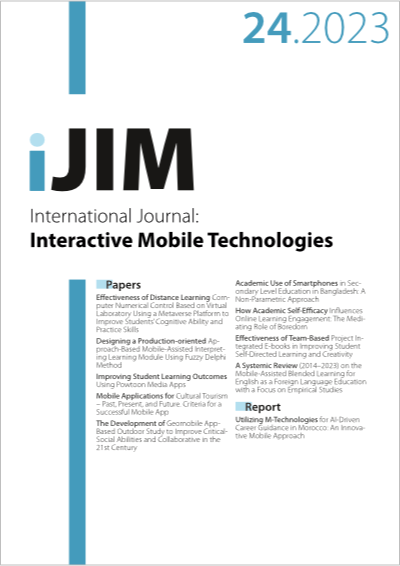Effectiveness of Distance Learning Computer Numerical Control Based on Virtual Laboratory Using a Metaverse Platform to Improve Students’ Cognitive Ability and Practice Skills
DOI:
https://doi.org/10.3991/ijim.v17i24.45019Keywords:
virtual laboratory, distance learning, computer numerical control, cognitive ability, practice skillsAbstract
This study analyzes the effectiveness of virtual laboratory-based distance learning as a means of improving the learning outcomes of students’ cognitive abilities and practical skills in the Computer Numerical Control course. This study utilized a pre-experimental design with a onegroup pretest-posttest structure. The research subjects were 31 second-year vocational students from the Department of Mechanical Engineering at Universitas Negeri Padang who had recently participated in four distance learning sessions. The research instruments included a pre-test, a post-test, and a student perception survey to assess the effectiveness of virtual laboratory treatment. The findings of this study demonstrate that the presence of a virtual laboratory enhances learning outcomes in terms of cognitive abilities. The pre-test value for cognitive abilities was 52.04, which increased to 82.36 in the post-test. Similarly, the pre-test value for practical skills was 56.98, which improved to 83.44 in the post-test. These improvements significantly contribute to the enhancement of learning outcomes, as indicated by an average N-gain value of 0.642 in the medium/effective category. We conclude that the use of virtual laboratory media through the Metaverse platform is effective for distance learning. This method reduces the initial requirement of 24 hours of face-to-face learning to just five hours of more effective self-study.
Downloads
Published
How to Cite
Issue
Section
License
Copyright (c) 2023 Febri Prasetya, Aprilla Fortuna, Agariadne Dwinggo Samala, Bayu Ramadhani Fajri, Fiki Efendi, Abel Nyamapfene

This work is licensed under a Creative Commons Attribution 4.0 International License.



